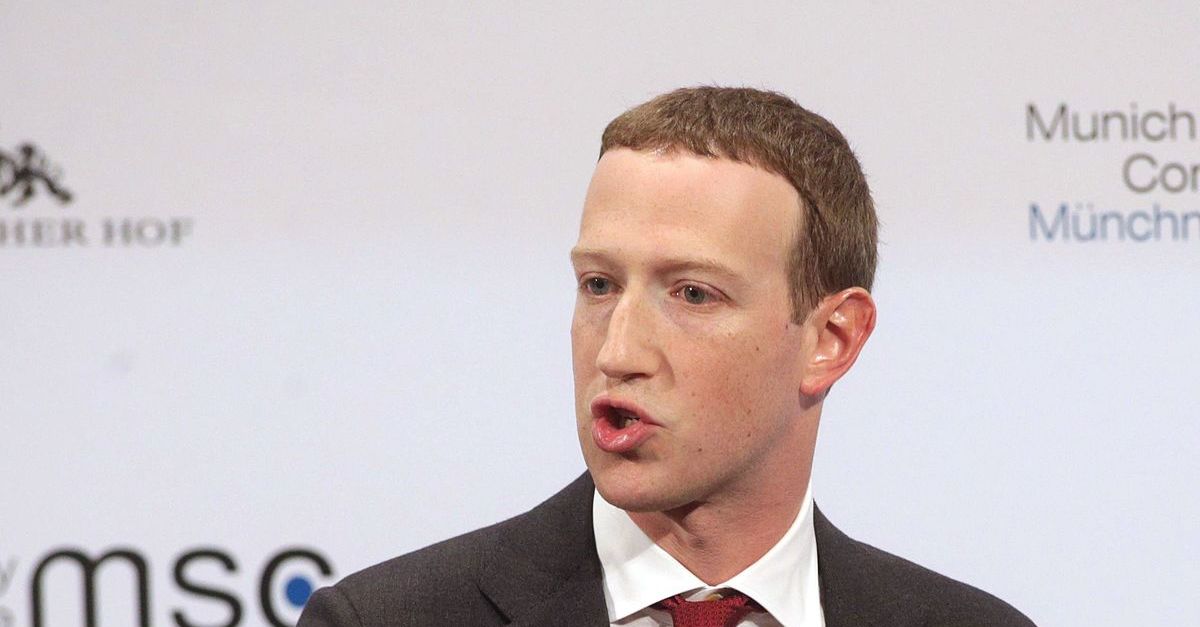
Mark Zuckerberg at the Munich Security Conference (MSC) 2020
Facebook CEO Mark Zuckerberg was “personally involved” in the Cambridge Analytica scandal and “encouraged” the manipulation of the 2016 presidential election, D.C. Attorney General Karl Racine alleged in a lawsuit filed Monday.
Racine previously made such allegations late last year, when he asked a D.C. judge to add the tech billionaire to a still-pending lawsuit against Facebook.
“This Unprecedented Security Breach”
After Superior Court Judge Maurice Ross rejected a motion to amend the lawsuit, Racine filed a separate lawsuit against Zuckerberg on Monday. Ross criticized the delay in the request to add Zuckerberg as a defendant, but the attorney general’s office reportedly justified it on what surfaced during discovery against Facebook.
“Since filing our landmark lawsuit against Facebook, my office has fought tooth and nail against the company’s characteristic efforts to resist producing documents and otherwise thwart our suit. We continue to persist and have followed the evidence right to Mr. Zuckerberg,” Racine wrote in a statement. “The evidence shows Mr. Zuckerberg was personally involved in Facebook’s failure to protect the privacy and data of its users leading directly to the Cambridge Analytica incident. This unprecedented security breach exposed tens of millions of Americans’ personal information, and Mr. Zuckerberg’s policies enabled a multi-year effort to mislead users about the extent of Facebook’s wrongful conduct. This lawsuit is not only warranted, but necessary, and sends a message that corporate leaders, including CEOs, will be held accountable for their actions.”
In a 37-page complaint, Racine did not flinch from implicating Zuckerberg in the Cambridge Analytica scandal.
“In other words, Cambridge Analytica used the Facebook Platform—in a way that Facebook and Zuckerberg encouraged—to influence and manipulate the outcome of a United States presidential election,” the complaint states. “The personal data of the more than 70 million U.S. Facebook users that Cambridge Analytica used to manipulate the election accounted for more than half the total votes during the 2016 presidential elections, in an election that was effectively decided by just a few hundred thousand people.”
According to the lawsuit, the cover-up followed the breach.
“The Cambridge Analytica revelations shocked the world, but it was no surprise to Facebook or Zuckerberg,” the complaint states. “Facebook had both a longstanding relationship with Cambridge Analytica and also actively encouraged companies like Cambridge Analytica to use the Facebook Platform to influence and manipulate consumer behavior.”
“What is most troubling is that Facebook looked into Cambridge Analytica and determined that it posed a risk to consumer data but chose to bury those concerns rather than stop them, as that could have hurt Facebook’s (and Zuckerberg’s) bottom line,” it continues. “Instead of coming clean, Facebook continued to help Cambridge Analytica win a United States presidential election.”
“It Was My Mistake”
Indeed, as noted in the lawsuit, Zuckerberg acknowledged defining Facebook’s responsibilities too narrowly in April 2018.
“We didn’t take a broad enough view of what our responsibility is, and that was a huge mistake,” Zuckerberg said at the time. “It was my mistake.”
Racine claims that Zuckerberg violated the District’s Consumer Protection Procedures Act (CPPA), which prohibits unfair and deceptive trade practices. The attorney general’s office seeks an injunction barring future violations, along with civil damages.
Professor David Vladeck, who directs the Civil Litigation Clinic at Georgetown Law, praised Racine’s willingness to take his fight to the top of Facebook’s organization in a phone interview with Law&Crime.
“The real question is, when you’re trying to hold an entity like Facebook responsible, ‘Who ultimately is the final decision maker?'” Vladeck noted. “And Facebook is an odd organization because Zuckerberg owns virtually all of the stock that allows him to, you know, basically to do whatever he wants with Facebook.”
When he directed the Bureau of Consumer Protection at the Federal Trade Commission, Vladeck helped secure the 2012 consent decree against Facebook. Some five years later, that decree resulted in a $5 million civil penalty against Facebook for privacy violations resulting from the Cambridge Analytica scandal.
“Unless Zuckerberg is responsible for compliance, there really is no other way to threaten Facebook,” Vladeck said. “If you look at the FTC’s second consent decree with Facebook, Zuckerberg is very much on the hook for all of the oversight and reporting requirements.”
In retrospect, Vladeck said, the FTC should have gone after Zuckerberg a decade ago.
“One of the things that really pissed me off about this is, if you go back and look at the first complaint alleging misfeasance by Facebook—the one that I worked on—one of the things that we pressed was that Facebook was harvesting information about people’s political views, without their knowledge or consent,” Vladeck noted. “And so if you look at the first consent decree, it was designed to ensure that there was no repeat of the kinds of things that then took place just a couple of years later, in Cambridge Analytica.”
Since Zuckerberg wasn’t personally under order in the first FTC case, Vladeck added ruefully that in hindsight: “That was an error on our part.”
Facebook did not respond to an email requesting comment.
Read the lawsuit, below:
(Photo by Johannes Simon/Getty Images)